Interview: Richard Thompson on recording an album in front of a live audience
Folk legend also talks singer-songwriter Caribbean cruising, BBC sessions, OBEs and Grammys
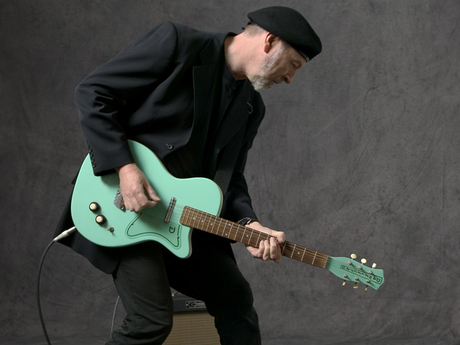
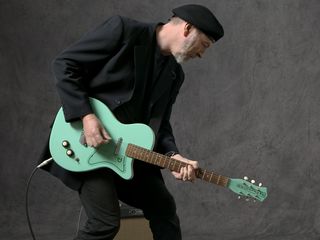
After a hectic 2010, Richard Thompson could be excused for taking things a little easier at the beginning of this year, but his diary is already fit to bursting for the next couple of months, with more irons in the fire ahead. He's currently on his lengthiest UK tour for more than 20 years, which will be followed by a more curious booking, cruising the Caribbean in the company of several other top-flight musicians from the world of folk and country music.
Thompson's UK shows are in support of Dream Attic, the highly-acclaimed album he released last summer which has earned him a Grammy nomination. He took the unusual step of recording it in front of live audiences during a handful of dates on the US west coast last February. Between its recording and its release, he took up residence on London's South Bank as the 2010 curator of the Meltdown festival, the annual series of music shows inviting all manner of high-profile collaborations.
The 10-day event found Thompson treading the boards almost every night, either guesting with the likes of Elvis Costello and Paolo Nutini, sparring with his old friend Loudon Wainwright, conducting a master class with his own favourite guitarists (including the legendary James Burton and jazz virtuoso John Etheridge), reviving his chronological history lesson 1000 Years Of Popular Music, hosting an evening of political song, or presenting the UK premiere of his evocative stage musical Cabaret Of Souls.
For many, the highlight of Meltdown was the tribute to Thompson's long-time friend Kate McGarrigle, for which he brought together her singer-songwriter children Rufus and Martha Wainwright, plus such famous fans as Emmylou Harris, Nick Cave and Neil Tennant. The show also saw the first unaccompanied performance by Richard and his former wife Linda in almost 30 years.
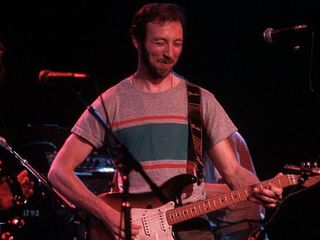
At The Roxy, circa 1998 © Henry Diltz/CORBIS
The publicity surrounding Meltdown may arguably have had a hand in Thompson coming to the attention of the establishment, who bestowed an OBE on him in the New Years honours list - not that he's given it much thought while busying himself on his upcoming projects.
In addition to the UK tour and the Caribbean cruise, MusicRadar can exclusively reveal that a box set of BBC sessions is due in the spring. The three-CD set will include an entire disc of Richard & Linda songs recorded in the '70s, many for John Peel, plus further discs of his '80s/'90s output for the corporation and more recent tracks. An additional DVD trawls the archives of The Old Grey Whistle Test and beyond.
Get the MusicRadar Newsletter
Want all the hottest music and gear news, reviews, deals, features and more, direct to your inbox? Sign up here.
For now, though, the UK tour is foremost in Thompson's mind, a live outing for the tracks from Dream Attic - although the album in itself was "live". He spoke at length to MusicRadar about the year ahead.
What was the thinking behind recording Dream Attic in front of an audience?
"My thinking was probably confused and muddled, haha! No, I thought it would be an interesting experiment to trade off the focus you get in the studio for the energy you get from playing live.
"People often come up to me and say they really like the albums but prefer the live versions of the songs. In concert they tend to have more energy, so I wanted to try and short circuit the process and go straight to the stage. It was really interesting to do it, and I think it's been fairly successful."
Next: more on Dream Attic and guest musicians
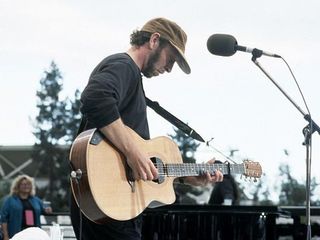
Onstage in LA circa 1993 © Henry Diltz/CORBIS
What was the major difference, do you think?
"It turned out to be a lot more work for the musicians, because in the studio you have the luxury of focusing on one song at a time; if you're truly anal you could spend six weeks on one song if you wanted to, doing re-takes and overdubs. When it's live, the band have to learn 75 minutes of music and play it without making mistakes, and that's a tall order.
"We did have the benefit of recording multiple nights so we could pick and choose between individual performances, but even so it's a much tougher process than being in the studio. I have to confess that I was occasionally surprised by the dynamics of it, a few nuts and bolts we weren't expecting revealed themselves, but I think the lads did good!"
Is it something you'll consider doing on future releases?
"I think I would, although I'm not quite sure what happens next. Dream Attic was very positively reviewed, audiences really seemed to like it, so am I now cursed to do everything live? Am I allowed to go back in the studio, now that the public have spoken?!"
Have you been frustrated by the way some of your studio albums have turned out?
"Well, I tend not to take too long in the studio, the process is usually very quick. I try to record as live as possible with a minimal amount of overdubbing, we hardly ever indulge ourselves with a Take Two, but it is true that some songs never really catch fire in the studio, you only really learn what they're about when you play them in concert."
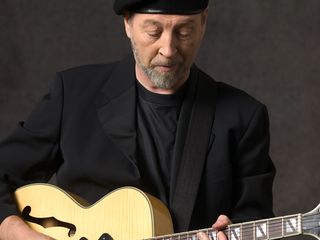
Give us a rundown on the "lads" who played on Dream Attic and are accompanying you on tour. You've been working on and off with Pete Zorn (guitars, sax, flute, mandolin) for at least 30 years.
"I first worked with Pete on a couple of Gerry Rafferty things in the late '70s, and the first time he was on one of my albums was when he played bass on Shoot Out The Lights in 1981. He switched to saxophone on the next album, Hand Of Kindness, because we wanted a broader palette of sounds for those songs, things like Tear-Stained Letter and Two Left Feet.
"He's been in and out of the band over the years, but pretty much a constant since the start of the '90s. He's a very versatile musician, and he's also a good singer which means I can put songs in the set that I wouldn't be able to pull off as well if I was playing solo shows.
"His versatility brings with it so many arrangement possibilities, he's like three people for the same money."
Bassist Taras Prodaniuk will be a familiar name to some country fans.
"Indeed. He worked with Dwight Yoakam for many years, and more recently with Lucinda Williams. So, yes, his roots are in country music, but he's much more than that, he's an extremely gifted and versatile musician. It's all about feel with bass players, I think, it's not just where you put the notes, it's where you leave the holes."
Next: More guests, Caribbean cruising 'folk'-style
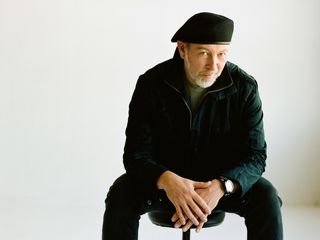
Is the "feel" that others bring to your songs important? You don't appear to be the dictatorial sort who has every single note written in stone.
"Well, I think I know what I want to be played, but I'm never closed to suggestions. It's a bit of both, I suppose, a meeting in the middle. I'll have an idea of what something should sound like, and I'll make demos for the band to give them an idea of what I'm looking for, so that when we start rehearsing there's a least some sort of blueprint to work from.
"As long as it's close to what I had in mind I'm happy, I'm not looking for absolute slavish reproductions of my intentions. Other people's ideas and input can be really exciting, because the song ends up going somewhere I hadn't anticipated. It's give and take."
Joel Zifkin (violin, mandolin) is another old hand, isn't he?
"Yes, he's from Montreal and has played with Kate & Anna McGarrigle, and more recently with Kate's son Rufus Wainwright. What I really like about him as a fiddle player is that he isn't locked in to a tradition the way a lot of fiddle players can be. He doesn't just play Scots/Irish folk, he doesn't just play Appalachian, he doesn't just play bluegrass. He's got a much more open mind to the material, whereas sometimes a violin can dictate the overall sound and stifle the creativity of the other musicians."
Michael Jerome (drums) has been with you for about 12 years.
"It's about that long now, yes. Once again, he's a musician with a great feel. He's actually from Texas, but he has superb instincts for Celtic music. He really studies all genres of music, and is able to respond to anything that's put in front of him. I'm really happy to have him in the band, because he's able to shift things up a couple of gears and take the songs to places I hadn't imagined when I was writing them.
"So, overall I think we can cover a lot of ground with just the five of us, I really don't like music that's clogged up by about a dozen people all vying to be heard at the same time. I'm not that keen on a sound that's too full, for want of a better description. If you have really good musicians you can leave more holes."
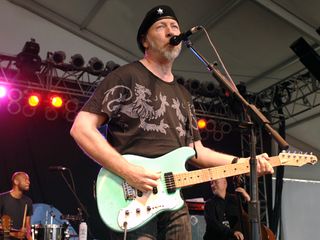
At Bonnaroo Music and Arts Festival 2007 © Tim Mosenfelder/Corbis
Immediately after the tour you head off on an eight-day cruise under the heading A Journey Through Song. You're joining a formidable bill of folk and country acts, including Buddy Miller and Patty Griffin (fresh off their tour with Robert Plant), Steve Earle, Allison Moorer, Loudon Wainwright, John Prine, Indigo Girls, Colin Hay, Dar Williams and Shawn Mullins. What's that all about?
"It's basically a singer-songwriter cruise, as far as I can tell. I've never done anything like this before, but this is the fourth year of this particular gathering, and many of the names you mentioned have been on previous cruises, so it must be good if they're coming back for more.
"It's a bunch of really interesting people. It sets sail from Miami and goes around the eastern Caribbean, the Virgin Islands, the Bahamas, what have you. Everyone does about three performances, plus various kinds of workshops and master classes with the passengers - I'll probably be doing Broadside Ballads, 1522 to 1523! I'll try and do something very obscure but educational!
"I've done a few songwriting and guitar workshops here and there in the past, but nothing as intensive as this. I had to think very long and hard about whether I was old enough to go on a cruise, because they mostly have this reputation of being full of senior types, shall we say.
"No, it should be a lot of fun, and who knows, there may be a few interesting collaborations along the way. There's nothing planned along those lines, but I would be surprised if it didn't happen."
And who knows, perhaps the next big folk star will be among the passengers...
"There's always that possibility. When I've done these things before on a smaller scale, I've been constantly surprised by the level of talent that's out there just waiting to be discovered. It'll be great to work with Loudon again; we're old friends and we played together at Meltdown last summer, but we may well find someone whose writing and playing puts us both in the shade!"
Next: BBC Folk Awards, Grammys and OBEs
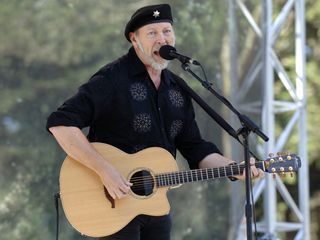
Onstage at Hardly Strictly Bluegrass in 2008 © Tim Mosenfelder/Corbis
The start of every year also signals the beginning of the awards season, and you're up for Musician Of The Year at the BBC Folk Awards, having been given a lifetime achievement gong five years ago. You've also scored your third Grammy nomination; do you think this might be your year?
"Dream Attic is nominated in the category of Best Contemporary Folk Album, although it's probably the least folky album I've done for about 20 years, but never mind. I don't think I'm gonna win, anyway. There's a couple of us old hands nominated; Jackson Browne is in there, but I don't think he'll win either, I think it'll probably go to Ray Lamontagne.
"Bigger labels tend to block vote for each other's records, that's the way it's been for years - not that I'm suggesting in the slightest that Ray doesn't deserve to win, but I think everyone in the industry knows what the Grammys are about. It's an industry thing, has been for ages."
You have already got yourself an award this year, though. Did the OBE in the New Years honours list take you by surprise?
"It was a bolt from the blue, utterly and totally. I was genuinely gobsmacked, I've no idea who decides these things or how I came across their radar, or why it should have come about at this time in particular. I haven't got a date for the ceremony yet, they give you about six months to sort out your timetable, as it were, but it looks like it's going to be at St James's Palace which suggests I'll be receiving it from Prince Charles.
"That'll be good, I'm quite interested in meeting him. I met the Queen a few years ago, at a reception at Buckingham Palace, a sort of tribute to the music industry event. She was lovely, very charming. I met Shirley Bassey at the same thing, and the opera singer Dame Janet Baker who's long been one of my heroines."
It's interesting that so many of your songs over the years have been about various aspects of Britain and British life; from as far back as your days with Fairport Convention, through to the loose Englishness narrative of your Mock Tudor album and beyond, you've often put the nation under a microscope Perhaps OBE should stand for Observer of the British Empire.
"Haha! I'd be surprised if that has anything to do with the honour, to be honest, that's just my job as a songwriter. I think the honours system has changed over the years; it's about 75 per cent community-based, so the vast majority of awards are given to nurses, teachers and the like.
"That's how it should be, it's a good modern adaptation of the system, but I don't really know how I came to be considered. What I hope is that it's an indicator of how the whole folk end of music is being recognised at a broader level.
"Someone like Norma Waterson is long overdue an honour of some kind. Her husband, Martin Carthy, was made an MBE a few years ago, but Norma is just as deserving. Then there's someone like Ashley Hutchings, who was very much the architect of what was probably the biggest folk revival of the last 100 years. This is a guy who should get a knighthood."
Richard Thompson tours the UK until 3 February
The BBC Folk Awards are held on 7 February
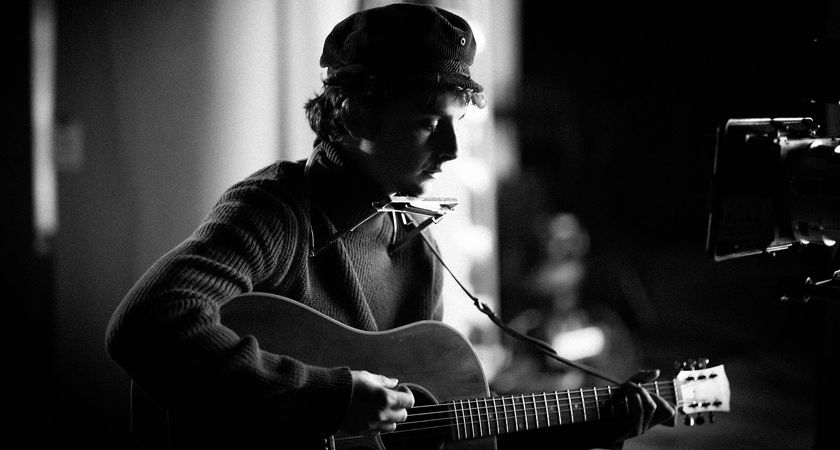
“It dawned on me, ‘Wow! I think that we’re learning how to do this just how Bob learned how to play’”: How Timothée Chalamet went from a complete guitar novice to become Bob Dylan onscreen
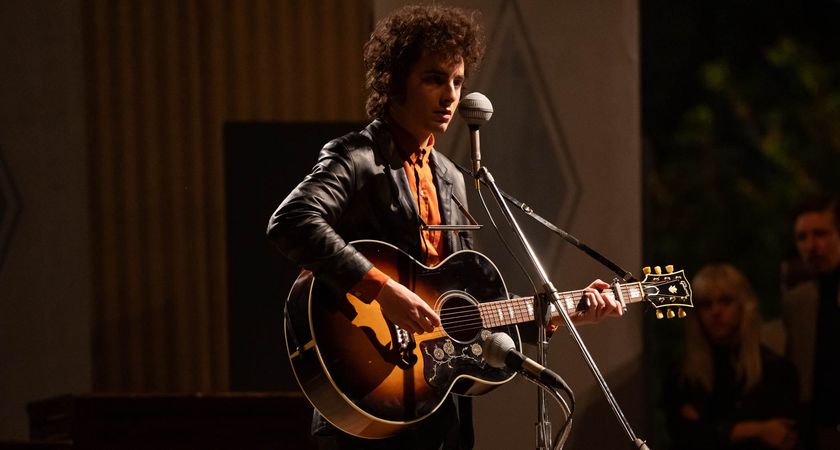
“I loved that he showed up with a $200 guitar… It’s humble”: Timothée Chalamet learned to play guitar for his Oscar-nominated role in Bob Dylan biopic on a beginner Yamaha acoustic
Most Popular









